Joseph Freiherr von Eichendorff
The protagonist, the son of a miller, rejects his father's trade and becomes a gardener at a Viennese palace where he subsequently falls in love with the local duke's daughter.[9] Eichendorff, a descendant of an old noble family, was born in 1788 at Schloß Lubowitz near Ratibor (now Racibórz, Poland) in Upper Silesia, at that time part of the Kingdom of Prussia.While previously preferring chapbooks, he was now introduced to the poetry of Matthias Claudius and Voltaire's La Henriade, an epic poem about the last part of the wars of religion and Henry IV of France in ten songs.[15] Together with his brother Wilhelm, Joseph studied law and the humanities in Halle an der Saale (1805–1806), a city near Jena, which was a focal point of the Frühromantik (Early Romantics).[25] His deep sorrow about the unrequitted love for the nineteen-year-old daughter of a cellarman inspired Eichendorff to one of his most famous poems, Das zerbrochene Ringlein (The Broken Ring).Ich möchte’ als Reiter fliegen Wohl in die blut’ge Schlacht, Um stille Feuer liegen Im Feld bei dunkler Nacht.Although Chase's translation weakens the second line from blut’ge Schlacht (bloody battle) to "in fight" this, actually, happens to be much closer to the historical truth, since Eichendorff's participation in the Lützow Free Corps seems to be a myth – in spite of some authorities asserting the contrary.[27] In 1813, when conflict flared up again, Eichendorff tried to join the struggle against Napoleon,[28] however he lacked the funds to purchase a uniform, gun, or horse, and, when he finally managed to get the money necessary, the war was all but over.Die Winde nur noch gehen Wehklagend um das Haus, Wir sitzen einsam drinnen Und lauschen oft hinaus.The motif itself had been central to romanticism since Wilhelm Heinrich Wackenroder and Ludwig Tieck undertook their famous Pfingstwanderung (Whitsun excursion) in the Fichtel Mountains in 1793, an event that began the Romantic movement.[43] The two writers who had the greatest early influence on Eichendorff's artistic development were Friedrich Schlegel, who established the term romantisch (romantic) in German literature,[44] and Joseph Görres.[45] Both movements, however, greatly influenced intellectual life in Germany by emphasising the individual, the subjective, the irrational, the imaginative, the personal, the spontaneous, the emotional, the visionary, and the transcendental over classical precepts.[51] Although Eichendorffs poetry includes many metric forms ranging from very simple elegiac couplets and stanzas to sonnets, his main artistic focus was on poems imitating folk songs."[60] The morning, on the other hand, evokes the impression that "all nature had been created just in this very moment,"[61][62] while the evening often acts as a mysterium mortis with the persona pondering transience and death.More recently, however, Christoph Hollender has noted that Eichendorff's late religious and political writings were commissioned works, while his poetry represents a highly personal perspective.[67] Eichendorff summed up the Romantic epoch stating that it "soared like a magnificent rocket sparkling up into the sky, and after shortly and wonderfully lighting up the night, it exploded overhead into a thousand colorful stars.
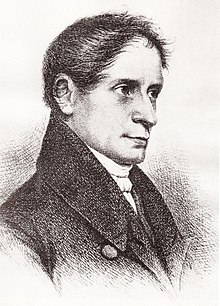
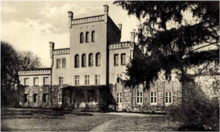


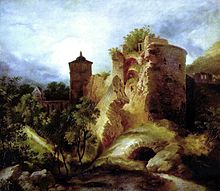


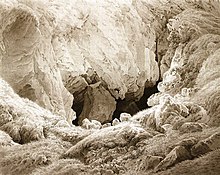
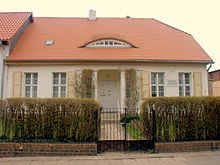
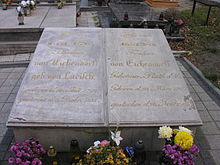



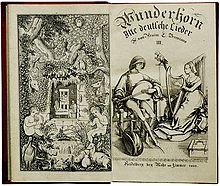










PolishRatiborPrussian SilesiaKingdom of PrussiaNeisseHeidelberg UniversityRomanticismMemoirs of a Good-for-NothingThe Marble StatueUpper Silesian OffensiveWorld War IIRacibórzHeidelberg CastleCarl Blechenliterary criticanthologistAus dem Leben eines TaugenichtsRomanticwanderlustThomas MannSchloß LubowitzUpper SilesiaPrussianFreiinRoman CatholicDeutsch-KrawarnRococoBreslauMatthias ClaudiusVoltaireLa HenriadeHenry IV of FranceAdalbert StifterUniversity of BreslauMozartHalle an der SaaleLauchstädtWeimarGoetheNapoleonUniversity of HeidelbergOtto Heinrich von LoebenAchim von ArnimClemens BrentanoJoseph GörresViennaBerlinAdam MüllerHeinrich von KleistHeidelbergDas zerbrochene RingleinLützow Free CorpsCaspar David FriedrichWilhelm Heinrich WackenroderLudwig TieckFichtel MountainsIfflandHamburgLübeckRegensburgNürnbergStrasbourgBurgundyLothringenAschaffenburgWürzburgNeustadt O.S. (Prudnik)DanzigKönigsbergMunichKöthenInnsbruckMeißenSedlnitzNeißePeter von CorneliusDes Knaben WunderhornFriedrich SchlegelVolksliedThomas PercysonnetsemblematicsWünschelruteNatias NeutertLudwig RichtermetaphysicalTheodor W. AdornoCaroline de la Motte FouquéBettina von ArnimrealismmodernismLiederkreis, op. 39de la Motte FouquéDas MarmorbildJuan ManuelCalderonsUpper SilesianAarne-Thompson-Uther IndexBeauty and the BeastAllerleirauhPeruontoEmelian the FoolSnow WhiteThe Golden BirdLebrecht Blücher DrevesPrudnikJohannes BoesereplacementSchumannMendelssohnJohannes BrahmsHugo WolfDidia Saint GeorgesRichard StraussHans PfitznerPauline VolksteinHermann ZilcherAlexander ZemlinskyMax RegerFriedrich NietzscheEine romantische SuiteWilhelm KoschAugust SauerMax Niemeyer VerlagWangen im AllgäuEichendorff-Literaturpreis